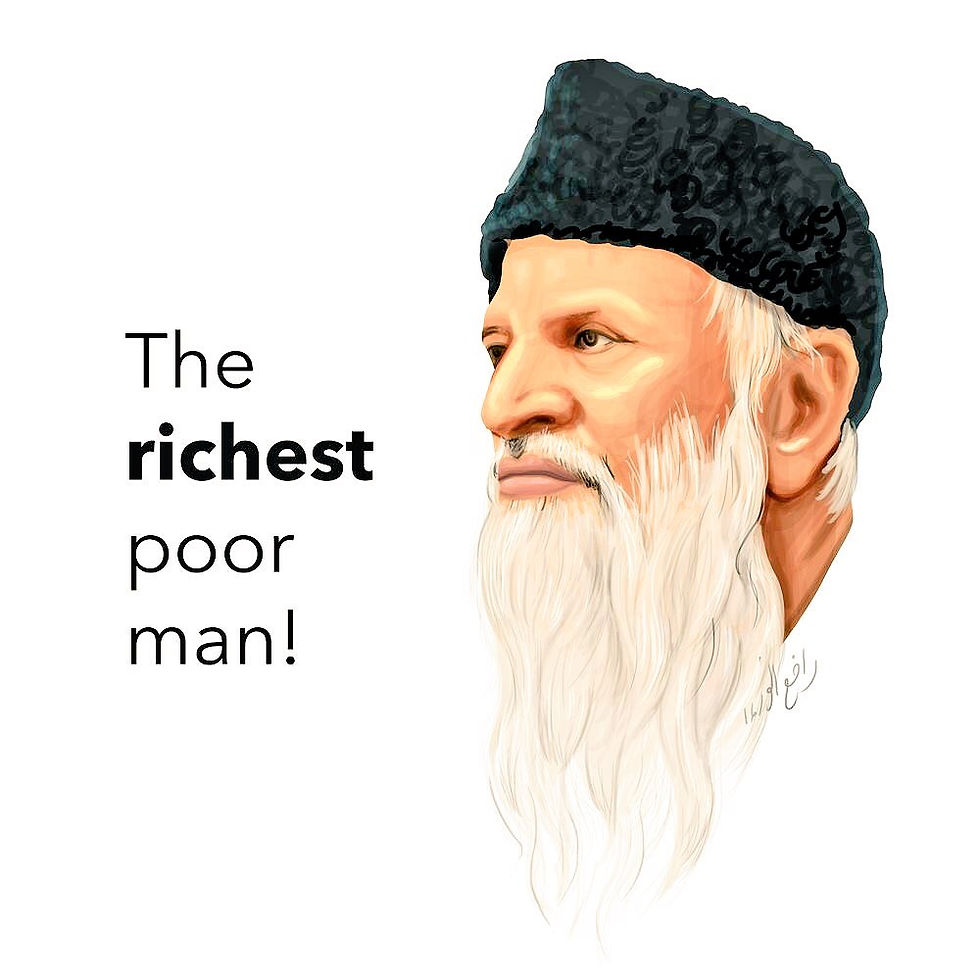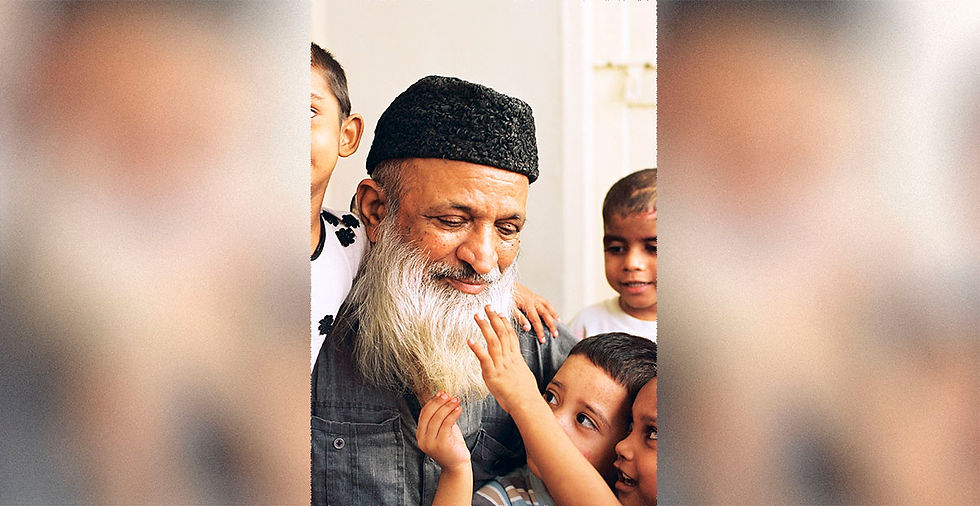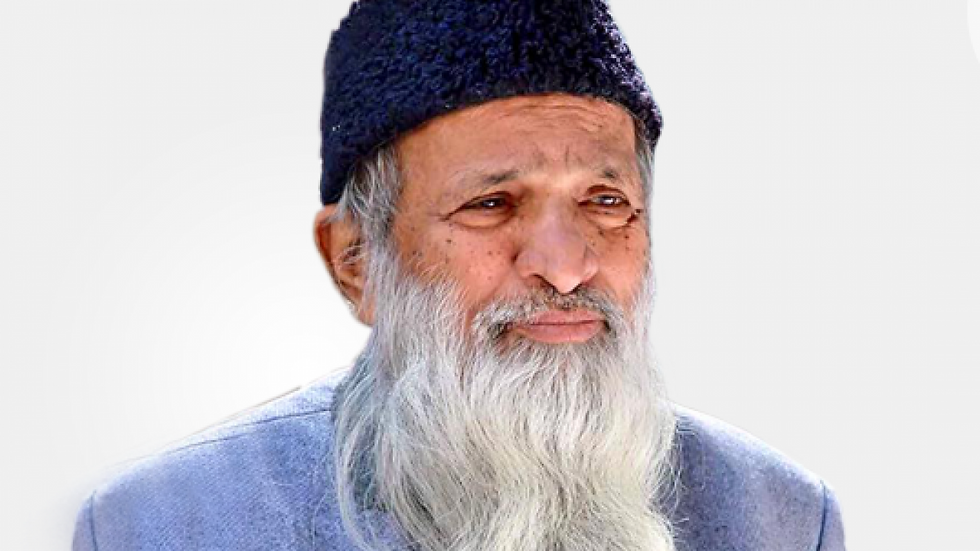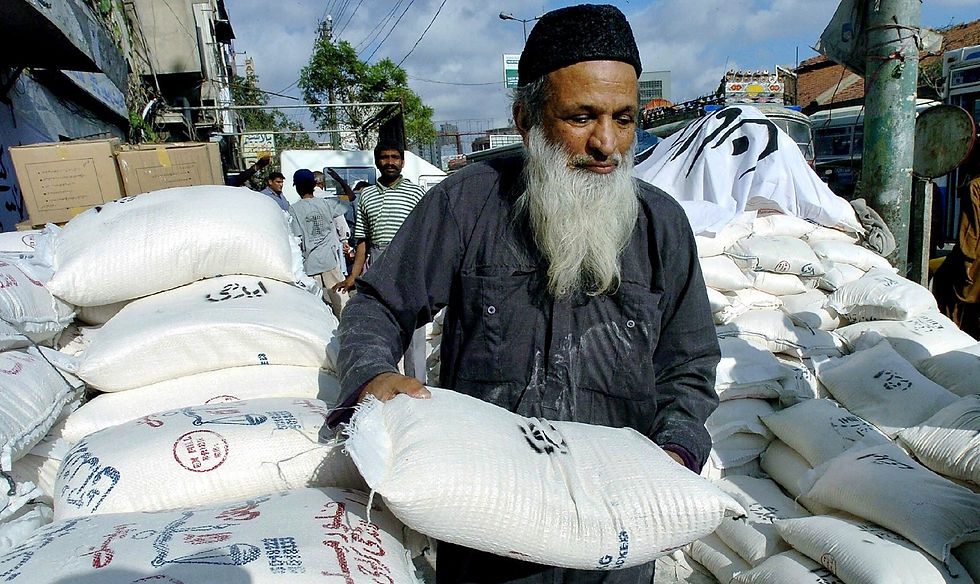Late Abdul Sattar Edhi – The Richest Poor man.
- Aug 21, 2020
- 6 min read
The Huffington Post n 2013, claimed that he might be "the world's greatest living humanitarian. a parent or guardian of nearly 20,000 Adopted children of whom he was an active caretaker.
Born : Abdul Sattar Edhi I 28 February 1928 I Bantva, Gujarat, British India

Abdul Sattar Edhi was born on 28 July 1928 in Bantva, Gujarat, British India (present-day India) to a Memon family. In his biography, he said his mother would give him 1 paisa for his meals and another to give to a poor/needy child. When Edhi was eleven years old, his mother became paralysed from a stroke and died by the time he turned nineteen in 1947. His personal experiences as a dedicated caretaker for his mother during her illness drove him to develop a system of services for the old, mentally/physically ill and challenged. The partitioning of India later that same year led Edhi and his family to migrate to the newly founded Pakistan. He shifted to Karachi to work in a wholesale market. He initially started as a peddler, and later became a commission agent selling cloth. After a few years, he established a free dispensary with help from his community.
"People have become educated, but have yet to become human."
— Abdul Sattar Edhi
Early Days of the Edhi Trust
The spirit of the Edhi Foundation was born when Abdul Sattar Edhi was a child. At the tender age of eleven, Edhi experienced his mother becoming paralyzed and mentally ill after suffering from a major stroke. A young Edhi devoted himself to her care and took on the role of feeding, bathing, and clothing her daily while responding to any and every call and necessity she required. Her deteriorating mental and physical condition left a strong and lasting impact on Edhi's mind. As a result, he dropped out of school and strictly focused on his mother's health. Edhi's mother died when he was nineteen in 1947. Her death made him reflect on others around him who were suffering from similar illnesses. After his family moved to Pakistan later that year, Edhi established a free dispensary with the help of other community members. His vision for establishing and improving the healthcare sector in Pakistan enabled him to establish a personal welfare trust for the people called "Edhi Trust". With the help of public funding, Edhi Trust was able to collect Rs.200,000. He expanded the trust to other medical fields and through hard work and diligence, he went on to establish a maternity home and an emergency ambulance service with the primary goal of helping those who could not help themselves. Edhi made it a habit to involve himself in every aspect of his foundation whenever possible. His foundation raised money for most noble causes and eventually, the Edhi Foundation had allotted a quota for each humanitarian cause, whether it was burying abandoned corpses or aiding in disaster relief.

He told NPR in 2009: "I saw people lying on the pavement... The flu had spread in Karachi, and there was no one to treat them. So I set up benches and got medical students to volunteer. I was penniless and begged for donations on the street. And people gave. I bought this 8-by-8 room to start my work."
In 1948, at the age of 20, Edhi joined a Memon charity as a volunteer. However, once he found out that the charity only attended to the needs of Memon people, he confronted his superiors to no avail, which caused him to leave to form an independent medical centre. He feared the Memon community would retaliate and possibly have him killed because of the stand he made, so he left the country in search of both safety and knowledge. Edhi travelled to Europe and made his way to London via Rome by asking for donations. His time in London allowed him to thoroughly examine the social welfare programs active throughout the United Kingdom, off of which he organized and laid the foundation for the rest of his charitable works.

The Edhi Foundation and Bilquis Edhi Trust
During his time in London, Edhi resolved to dedicate his life to aiding the poor, and over the next sixty years, he single-handedly changed the face of welfare in Pakistan. He subsequently founded the Edhi Foundation. Additionally, his previously established welfare trust, named the Edhi Trust was restarted with an initial sum of Rs.5000, the trust was later renamed after his wife as the Bilquis Edhi Trust. Widely regarded and respected as a guardian and saviour for the poor, Edhi began receiving numerous donations which allowed him to expand his services. To this day, the Edhi Foundation continues to grow in both size and service and currently remains the largest welfare organization in Pakistan. Since its inception, the Edhi Foundation has rescued over 20,000 abandoned infants, rehabilitated over 50,000 orphans and has trained over 40,000 nurses. It also runs more than 330 welfare centres throughout rural and urban Pakistan that operate as food kitchens, rehabilitation homes, shelters for abandoned women and children, and clinics for the mentally and physically handicapped.

The Edhi Foundation is funded entirely by private donations and full services are offered to people irrespective of ethnicity, religion or status. It runs the world's largest volunteer ambulance service (operating over 1,500 of them) and offers 24-hour emergency services. It also operates free nursing homes, orphanages, clinics, women's shelters and rehabilitation centres for drug addicts and the mentally ill. Outside of its main base of operations all over South Asia, the Edhi Foundation has also run relief operations in the Middle East, Africa, the Caucasus region, Eastern Europe, and the United States. In 2005, the foundation donated US$100,000 to relief efforts after Hurricane Katrina. As of 2020, the Foundation has international head offices present in the United States, United Kingdom, United Arab Emirates, Canada, Australia, Nepal, Bangladesh, India and Japan.
He was dubbed to be Pakistan's equivalent of Mother Teresa by India Today in 1990, and the BBC wrote that he was considered "Pakistan's most respected figure and was seen by some as a saint.

Illness and death
On 25 June 2013, Edhi's was hospitalized due to failing kidneys; it was announced that he would be on dialysis for the rest of his life unless he found a kidney donor. He later died on 8 July 2016 at the age of 88 due to complete kidney failure after having been placed on a ventilator. One of his last wishes was that his organs be donated for the use of the needy but due to his poor health, only his corneas were suitable for later use in donation. He was laid to rest at Edhi Village in Karachi.

Legacy
On 28 February 2017, Google celebrated Edhi with a Google Doodle hailing his "super-efficient" ambulance service.
World-renowned photographer Shahidul Alam photo-documented Edhi since 1995.
Proposals
In 2011, then - Prime Minister of Pakistan Yousaf Raza Gilani recommended Edhi for a nomination for the Nobel Peace Prize. Again in early 2016, a petition signed by 30,000 for a Nobel Peace Prize for Edhi was moved by Ziauddin Yousafzai, the father of Malala Yousafzai. In her condolence message on Edhi's death, broadcast by BBC Urdu, Malala quoted that "as a Nobel Peace Prize winner, I hold the right to nominate people for the prize and I have nominated Abdul Sattar Edhi".
Najam Sethi, a governing board member of the Pakistan Cricket Board proposed to rename Gaddafi Stadium after Edhi.

International Awards
· Ramon Magsaysay Award for Public Service (1986)
· Lenin Peace Prize (1988)
· Paul Harris Fellow from Rotary International (1993)
· Peace Prize from the former USSR, for services during the Armenian earthquake disaster (1988)
· Hamdan Award for volunteers in Humanitarian Medical Services (2000), UAE
· International Balzan Prize (2000) for Humanity, Peace and Brotherhood, Italy
· Peace and Harmony Award (2001), Delhi
· Peace Award (2004), Mumbai
· Peace Award (2005), Hyderabad Deccan]
· Gandhi Peace Award (2007), Delhi
· Seoul Peace Prize (2008), Seoul
· Honorary doctorate from the Institute of Business Administration Karachi (2006).
· UNESCO-Madanjeet Singh Prize (2009)
· Ahmadiyya Muslim Peace Prize (2010)
· Honorary Doctorate by the University of Bedfordshire (2010)
· London Peace Award (2011), London
National Awards
· Silver Jubilee Shield by College of Physicians and Surgeons (1962–1987)
· Moiz ur rehman Award (2015)
· The Social Worker of Sub-Continent by Government of Sindh (1989)
· Nishan-e-Imtiaz, civil decoration from the Government of Pakistan (1989)
· Recognition of meritorious services to oppressed humanity during the 1980s by Ministry of Health and Social Welfare, Government of Pakistan (1989)
· Pakistan Civic Award from the Pakistan Civic Society (1992)
· Jinnah Award for Outstanding Services to Pakistan was conferred in April 1998 by The Jinnah Society. This was the first Jinnah Award conferred on any person in Pakistan.
· Shield of Honor by Pakistan Army (E & C)
· Khidmat Award by the Pakistan Academy of Medical Sciences
· Bacha Khan Aman (Peace) Award in 1991
· Human Rights Award by Pakistan Human Rights Society
· 2013 Person of the Year by the readers of The Express Tribune
Source : Wikipedia & Google.
Comments